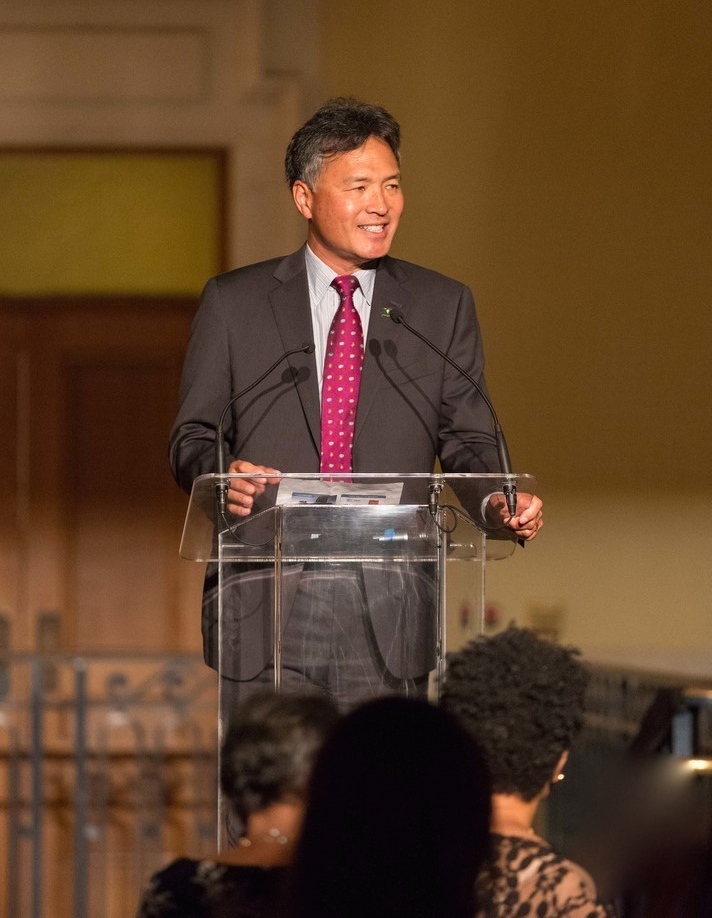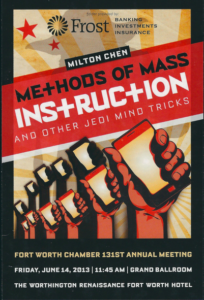
- innovative schools, public and private
- school districts, urban and rural
- regional education centers
- state departments of education and school boards
- colleges of education
- early childhood education groups
- national and state education associations (STEM, arts, bilingual, technology ed)
- museum, library, and after school organizations
- educational nonprofits and youth development groups
- companies supporting education
- foundations and their education grantees
My talks are illustrated with short film segments, showing innovative classroom practices in action, often from Edutopia.org, the Lucas Foundation’s popular multimedia website, with its archive of documentaries, available for free download and embedding.
My current speaking topics are described below along with example videos of two keynotes.
Current Speaking Topics
Six Leading Edges of Innovation in Our Schools
The Edges address fundamental shifts to our thinking about schooling; ways in which technology is transforming when, where, and how students learn; and roles of teachers and students as teachers collaborate with other educators and experts and students take more responsibility for their own learning.
Educating the Whole Child: The Role of the Arts, Nature, & Place-Based Learning
Instead of an “achievement gap,” Dr. Chen reframes the discussion to the “experience gap.” Many of today’s students are growing up without the broad range of experiences to connect school life to real life and to propel their educations forward with purpose and passion. Authentic place-based learning provides these experiences, gained through working in school gardens and visiting workplaces, historic sites, and public lands. These experiences enable them to learn not only about STEM, history, and cultures in powerful ways, but also lead them to think more deeply about themselves, their abilities, and their aspirations.
Weapons of Mass Instruction: Every Child with Digital Tools for Modern Learning
 Powerful digital devices are now affordable “weapons of mass instruction” for all learners. Providing them to every student, as well as teachers who know how to harness their power, has become one of the most significant civil rights issues of our time. Dr. Chen discusses how education holds the key to other societal goals, such as violence reduction, health care, employment, and community-building and how education is undergoing a Renaissance of how, when, and where it happens. The next generation of personalized tools will enable students to track and improve their own learning and behaviors. MIT’s Dr. Seymour Papert famously said that technology offers students “wheel for the mind.” Today’s students can learn more, faster, than in previous generations, powered by mobile devices, rich Internet resources, apps, games, and simulations, and networks of mentors.
Powerful digital devices are now affordable “weapons of mass instruction” for all learners. Providing them to every student, as well as teachers who know how to harness their power, has become one of the most significant civil rights issues of our time. Dr. Chen discusses how education holds the key to other societal goals, such as violence reduction, health care, employment, and community-building and how education is undergoing a Renaissance of how, when, and where it happens. The next generation of personalized tools will enable students to track and improve their own learning and behaviors. MIT’s Dr. Seymour Papert famously said that technology offers students “wheel for the mind.” Today’s students can learn more, faster, than in previous generations, powered by mobile devices, rich Internet resources, apps, games, and simulations, and networks of mentors.The Power of Inquiry and STEM Project-Based Learning (PBL)
STEM-based PBL represents an important “edge of innovation” in schools, as described in Dr. Chen’s award-winning book, Education Nation. PBL curricula connect to other “edges of innovation,” such as the role of technology and co-teaching and learning, as students work in teams to accomplish ambitious projects. Dr. Chen will also highlight work by Lucas Education Research, a second unit within the Lucas Educational Foundation, conducting rigorous research on the outcomes of PBL in elementary and secondary schools.
The Common Core of the Child: Arts Across the Curriculum
The digital arts now enable students to express their talents through photography, film, animation, music, and other forms. Dr. Chen will present examples from Edutopia.org of how the performing arts can improve reading and writing and how exploring the “grammar” of significant films can support learning in literature and history.
Learning From the Outside In: National Parks, America’s Best Outdoor Classrooms
With its Centennial in 2016, the National Parks gained greater visibility for their role as America’s best outdoor classrooms, where students learn valuable STEM lessons, but also gain front-row seats to connect American history to today’s events. These parks include the well known, from Gettysburg to Yosemite to the Grand Canyon, as well as smaller sites, such as the Japanese-American internment camp at Manzanar and Frederick Douglass’s home outside of Washington, D. C.
Technology supports these place-based experiences. The National Park Service website contains a wide range of lesson plans across grade levels as well as opportunities for virtual field trips and Ranger chats. Online platforms, such as iNaturalist, enable students to record, verify, and deepen understanding of plants and animals they encounter. Games, apps, and even virtual reality enable students to engage with National Park sites. Experiential learning can lead students to deeper reflection on their own lives, resilience, and passions.
Milton Chen has been an education advisor to the Golden Gate National Parks in the Bay Area and the National Park Service. He will describe how National Parks and other public lands are becoming an integral part of our nation’s new learning landscape and present examples of inspiring programs linking students to America’s most important places.
Selected Speaking Engagements
2021
- Asia Society of Northern California, in conversation with Dr. Yong Zhao, July 29
- YEE Education Learning Festival, Chongqing, China, March 27
2019
- Cal Poly Pomona, College of Business, January 30
- National Parks & Conservation Association, DC, April 2
- Legacy for Children Award, Children’s Discovery Museum, San Jose, May 10
- NorthStar Foundation, Omaha, October 10
2018
- Consortium for School Networking (CoSN), Washington, DC
- Scarsdale Public Schools
- Association of Wisconsin School Administrators, Wisconsin Dells
- Nelson Mandela Children’s Film Festival, Johannesburg
- Distinguished Leaders Speakers Series, Shawnee Mission School District, Kansas
- California Department of Education STEAM Conference, Long Beach
- Vermont Afterschool Conference, Stowe
- Schools of the Future with Kristi Yamaguchi, Honolulu
2017
- School CIO Summit, Marin County
- Suffolk County Annual Technology Conference (NYC)
- National Future Schools Expo, Melbourne
- Santa Clara County Office of Education, “Creativity at the Core,” San Jose
- American College of Education Commencement, Indianapolis
- SEK Schools 125th Anniversary, Valencia, Spain
- National Science Teachers Association (NSTA), New Orleans
- Erikson Institute, STEM Pathways, Chicago
2016
- Learning from the Outside In, National Parks Summit, Washington, DC
- WA Asso. of School Administrators, Small Schools Conference, Wenatchee, WA
- New Entrepreneur Network, Carson City, NV
- 2nd Annual FutureNow! Conference, Design39 Campus, San Diego
- Catapult Learning Leadership Institute, New York City
- MA Asso. of School Superintendents (MASS), Cape Cod
- Pacific NW Asso. of Independent Schools, Tacoma
- Orange County STEM, Tiger Woods Foundation, Anaheim
- Learning Forward Annual Conference, Vancouver BC
2015
- Association for the Advancement of International Education, San Francisco
- Thompson Forum on World Issues, “The Creative World,” Lincoln NB
- CA Asso. for Bilingual Education (CABE), San Diego
- North Carolina Summer Leadership Conference, “Education from a Global Perspective”
- English Speaking Scholastic Asso. (ESSARP), Buenos Aires
- Intel Visionaries, San Rafael, CA
- Ohio School Boards Asso., Columbus
- Global Human Resources Forum, Seoul
2014
- Woodring College of Education, Western Washington Univ., Bellingham
- National Title I Conference, San Diego
- National Association of Independent Schools (NAIS), Orlando
- Benson Education Lecture, Pacific Lutheran University, Tacoma
- New South Wales Asso. of Independent Schools, Sydney
- Education & Business Summit, South Carolina Dept. of Education, Greenville, SC
- National Association of Elementary School Principals (NAESP), Nashville
- Ed Sessions 2.0, Albertson Foundation, Boise
- Punahou School, Honolulu
2013
- American Association of Colleges of Teacher Education (AACTE), Orlando
- New York Department for Youth & Community Development
- Urban Libraries, Chicago
- Fort Worth Chamber of Commerce
- Bernard van Leer Foundation, The Hague, Netherlands
- Utah Rural Schools Association
- Omar Dengo Foundation, Costa Rica
- Beijing Academy
2012
- Rhode Island Afterschool Alliance, Cranston
- International Education Congress, Mexico City
- Colorado School Executives, Breckinridge
- ISF Academy, Hong Kong
- Prince George’s County Public Schools, MD
- PBK School Architecture, Dallas
- East Asia Regional Council of Schools (EARCOS), Kuala Lumpur
- Australian Council for Computers in Education (ACEC), Perth
2011
- Kansas School Librarians, Emporia, KS
- Association of Children’s Museums, Houston
- Teachers Leading Teachers, Northern Territory, Darwin, Australia
- Arts Education Partnership, San Francisco
- McCormick Early Learning, Chicago
- WebWise Conference, Institute of Museum and Library Services, Baltimore
- American Council on Teaching of Foreign Languages (ACTFL), Denver
2010
- Fred Rogers Center, St. Vincent College, Latrobe, PA
- Florida Teachers of the Year, Orlando
- Oregon School Boards Association, Portland
- Scholastic 21st Century Learners Summit, Boston
- Education Leaders Academy, University of San Diego
- International Education & Resource Network (IEARN), Toronto